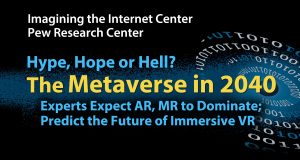Online audio event with Avi Bar-Zeev, Kelly Bates, Louis Rosenberg, Andre Brock, Toby Shulruff and Frank Kaufmann
Elon University and Pew Research invited six of the experts who participated in their 2022 survey on the future of the metaverse to a Twitter Spaces session in which they discussed where they expect that extended-reality tools will take society by 2040
 In 2022, in our 14th canvassing on the potential future of digital life, we asked thousands of experts to share their thoughts on the likely “Future of the Metaverse in 2040.” Six of the participants in that study joined Pew Internet director Lee Rainie and Imagining the Internet director Janna Anderson a few months after the release of that report, on September 15, 2022, for a 60-minute Twitter Spaces discussion of the big issues they see emerging as humanity delves deeper into adopting and adapting to XR tools.
In 2022, in our 14th canvassing on the potential future of digital life, we asked thousands of experts to share their thoughts on the likely “Future of the Metaverse in 2040.” Six of the participants in that study joined Pew Internet director Lee Rainie and Imagining the Internet director Janna Anderson a few months after the release of that report, on September 15, 2022, for a 60-minute Twitter Spaces discussion of the big issues they see emerging as humanity delves deeper into adopting and adapting to XR tools.
Click here to hear the full 60-minute program: https://youtu.be/EyKAvJKJ3uw
Find shorter breakout recordings of individual contributions here:
 Avi Bar-Zeev, founder and CTO of RealityPrime, is an XR pioneer who played important roles in developing and creating the technology of HoloLens, Google Earth and Second Life and has worked with Microsoft, Google, Apple, Amazon, Disney VR and more. Hear his part of the conversation: https://youtu.be/jz84NoaIVro
Avi Bar-Zeev, founder and CTO of RealityPrime, is an XR pioneer who played important roles in developing and creating the technology of HoloLens, Google Earth and Second Life and has worked with Microsoft, Google, Apple, Amazon, Disney VR and more. Hear his part of the conversation: https://youtu.be/jz84NoaIVro
 Kelly Bates, president of Interaction Institute for Social Change. She has been the director of four nonprofits, working as a civic leader and lawyer who has led advocacy, organizing, racial justice and women’s organizations for more than 25 years. Hear her part of the conversation: https://youtu.be/SbHLch2CvwU
Kelly Bates, president of Interaction Institute for Social Change. She has been the director of four nonprofits, working as a civic leader and lawyer who has led advocacy, organizing, racial justice and women’s organizations for more than 25 years. Hear her part of the conversation: https://youtu.be/SbHLch2CvwU
 Louis Rosenberg is CEO of Unanimous AI. His doctoral work at Stanford University resulted in the virtual fixtures system for the U.S. Air Force – an immersive augmented-reality system built in 1992, and he has been fully immersed in the business of advancing XR tools over the decades since. Hear his part of the conversation: https://youtu.be/lW29a5QKyug
Louis Rosenberg is CEO of Unanimous AI. His doctoral work at Stanford University resulted in the virtual fixtures system for the U.S. Air Force – an immersive augmented-reality system built in 1992, and he has been fully immersed in the business of advancing XR tools over the decades since. Hear his part of the conversation: https://youtu.be/lW29a5QKyug
 Andre Brock is an associate professor of literature, media and communication at Georgia Tech, award-winning author and adviser to the Center for Critical Race Digital Studies. His article “From the Blackhand Side: Twitter as a Cultural Conversation” challenged social science research. Hear his part of the conversation: https://youtu.be/6q8tcrS5IFA
Andre Brock is an associate professor of literature, media and communication at Georgia Tech, award-winning author and adviser to the Center for Critical Race Digital Studies. His article “From the Blackhand Side: Twitter as a Cultural Conversation” challenged social science research. Hear his part of the conversation: https://youtu.be/6q8tcrS5IFA
 Toby Shulruff is a futurist and senior technology safety manager at the Safety Net Project of the National Network to End Domestic Violence. She has worked with advocates at the national, state, territory, tribal and local levels to prevent violence since 1997. Hear her part of the conversation: https://youtu.be/8LdxT3KpbTo
Toby Shulruff is a futurist and senior technology safety manager at the Safety Net Project of the National Network to End Domestic Violence. She has worked with advocates at the national, state, territory, tribal and local levels to prevent violence since 1997. Hear her part of the conversation: https://youtu.be/8LdxT3KpbTo
 Frank Kaufmann is president of the Twelve Gates Foundation and of the Values in Knowledge Foundation and editor-in-chief of New World Encyclopedia. He is known globally, specializing in the promotion of harmony, religion and peace for more than four decades. Hear his part of the conversation: https://youtu.be/YwvIH65x1eE
Frank Kaufmann is president of the Twelve Gates Foundation and of the Values in Knowledge Foundation and editor-in-chief of New World Encyclopedia. He is known globally, specializing in the promotion of harmony, religion and peace for more than four decades. Hear his part of the conversation: https://youtu.be/YwvIH65x1eE
The full, 200-page report these experts discussed is an analysis of more than 600 experts’ responses to questions asking them to consider how people define ‘the metaverse’ in 2022 and to imagine the most likely evolution of extended-reality tools by 2040. We asked:
Will the metaverse be a much-more-refined and truly fully-immersive, well-functioning aspect of daily life for a half billion or more people globally by 2040 – yes or no? Tell us how you imagine that the shift of many online activities into more-fully-immersive digital spaces and digital life is likely to take place. Regardless of how you see the timing of this, how might it change human society? What are the likely positives of this transition? What negatives may emerge? How might it change the daily lives of the connected? And how will this transition change the way we think about our world and ourselves? We are also interested in hearing your thoughts about the role blockchain and its applications might play in this evolution of online life by 2040.
The result was a fairly even statistical split. 54% said by 2040 the metaverse WILL be a much-more-refined and truly fully-immersive, well-functioning aspect of daily life for a half billion or more people globally. 46% said by 2040 the metaverse WILL NOT be a much-more-refined and truly fully-immersive, well-functioning aspect of daily life for a half billion or more people globally.
The simple quantitative results are not fully indicative of the full complexities of the topic. The important findings are found in the respondents’ rich, deep qualitative replies. Read the report for full details.
The introductory remarks in this Twitter Spaces session by Lee Rainie and Janna Anderson outline a few of the most commonly occurring themes among the hundreds of expert responses. Here’s a short transcript of what they said:
Lee Rainie: I’m delighted to be part of this event with my colleague, Professor Janna Anderson, director of Elon University’s Imagining the Internet Center. For the past 19 years we have been canvassing experts about the biggest issues involving the future of the internet.
This past winter, we invited thousands of experts to share their views about the future of the metaverse by the year 2040, specifically, whether a sophisticated, fully-immersive metaverse will be a key part of the daily life for a significant part of the global population.
All told, 624 experts responded and the split quite evenly: half thought a well-functioning and fully-immersive metaverse would be an aspect of daily life for many people and half thought such a metaverse would not have that role in daily life.
In July 2022, we reported those findings and curated the experts’ extensive open-end responses to our question. Even though there was sharp disagreement about how the metaverse would evolve, both sides mostly agreed on two big ideas:
First, Augmented- and mixed-reality applications will dominate over virtual-reality advances. Most of these experts said they expect that broader adoption of virtual reality (VR) will be limited to enthusiastic but smaller user bases, especially gamers and entertainment seekers and in select business, medical, education and training settings.
Second, they argued that the next-generation networked-knowledge ecosystem can be built in ways that better serve people than the current Web does. Now, Prof. Anderson will give a quick rundown of the core arguments that both sides made in our report. Janna, over to you.
Janna Anderson: There were four big themes expressed by those who said they DO expect a well-functioning and much-more broadly adopted metaverse to be a key part of daily life by 2040 …
- They said profit motives will drive huge investment in the rapid development of extended-reality spaces, access and tools.
- They said the technology – the software, hardware, user interfaces and network capability to create an immersive universe is possible by 2040.
- They said the COVID 19 pandemic gave XR development a boost, as more people became more accustomed to immersing themselves in online interaction.
- And they said the metaverse will be developed enough to be a truly useful place in people’s daily lives in many new settings by 2040.
Among the major themes expressed by those who said they think a widely-adopted and well-functioning metaverse will NOT emerge by 2040 …
- They don’t expect that people will find it to be useful in daily life and think it will remain a niche space for a limited number of activities.
- They expect that the necessary software, hardware, user-interface and network improvements and capacity will NOT be available nor affordable by 2040.
- They said humans generally will continue to prefer to live their lives in real reality, using augmented or mixed-reality layers rather than full immersion in VR.
- They said fully-immersive spaces will magnify all of the problems arising out of digital life today and also predicted that people may avoid engaging in spaces that are operated in the service of surveillance capitalism and open to abuse by authoritarian regimes.

